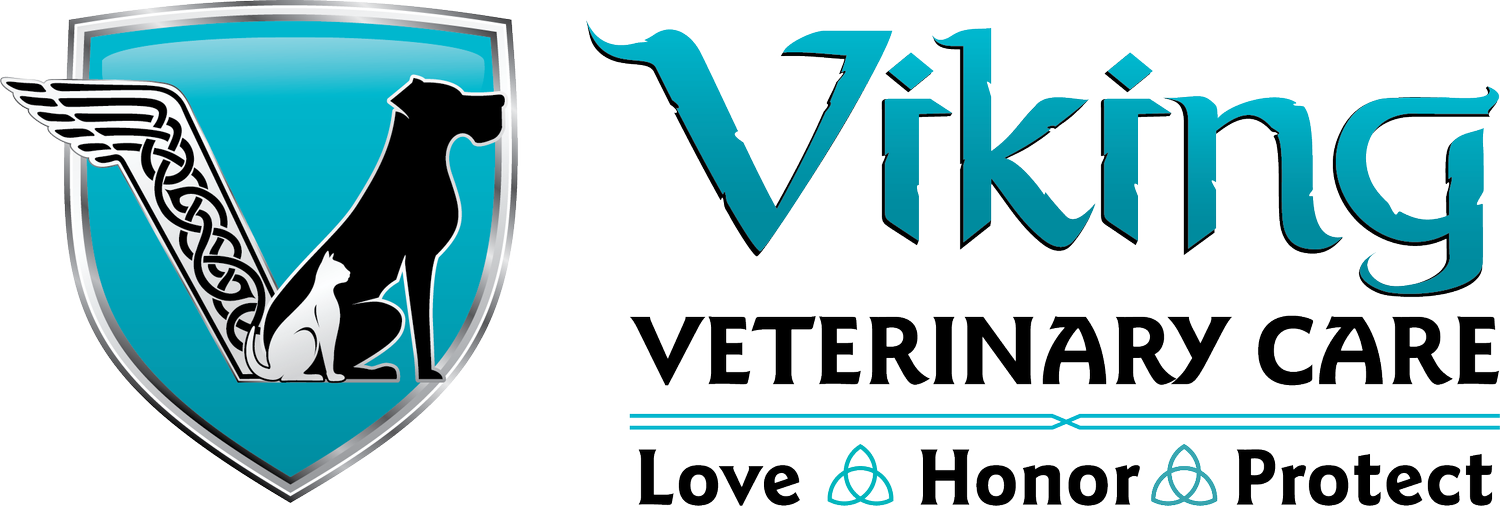The Viking Approach to Anesthetic Procedures
At Viking Veterinary Care, our Fear Free approach extends from our exam rooms to our surgery suite. Our veterinary team continuously updates our standards of care based on the latest research to provide the safest and most comfortable experience possible for all of our patients. These standards of care include:
Admission to our ICU, with cushioned bedding, calming pheromones, and direct supervision at all times.
Utilizing pre-visit pharmaceuticals (PVPs) to decrease the injectable medications needed for anesthesia induction and to make certain the “wake-up” period is free of fear, anxiety, and stress.
Preventing nausea and vomiting preemptively to protect our patients against aspiration pneumonia and help their appetite return shortly after their procedure.
Pre-oxygenation of all patients, providing a safer anesthetic induction.
Optimizing local anesthetics to numb surgery or dental extraction sites pre- and post-operatively to
prevent your pet from waking up in pain.
Full mouth radiographs for every dental procedure to evaluate the whole tooth, just like at your dentist.
Continued pain prevention after anesthesia, utilizing medications and laser treatment, to decrease inflammation and speed the healing process.
In Preparation for Your Pet’s Procedure
To best prepare your pet for their upcoming anesthetic procedure, please help us make their experience as smooth and safe as possible by:
Administering their PVPs prior to their pre-operative diagnostic appointment. This increases our likelihood of completing the diagnostics before surgery day and will keep your pet less stressed in a hospital setting...which is very important before a procedure!
Plan ahead for how to protect the surgical site. Recovery cones are available at our hospital, but some animals will do better with a recovery suit. We have a limited number of these available, so you may want to order them in advance online through Amazon.
Please review your treatment plan ahead of time and let us know what questions you have! We do have payment plans available from Care Credit and Scratch Pay. For more information, please click on the Care Credit and Scratch Pay links on our website.
The Night Before Anesthesia
Remember not to feed your pet the day of their anesthesia unless directed to do so by your veterinary team.
Give the PVPs as indicated on the labels.
Feel free to bring an item from home that is comforting to your pet when they are waking up from anesthesia. We recommend a favorite blanket that smells like home.
Comprehensive pre-anesthetic screening to ensure anesthesia is as safe as possible for your pet, including testing organ function, cell counts, and a cardiac ECG +/- chest radiographs.
Limiting our anesthetic procedures to a maximum of four per day, ensuring we can monitor each patient closely from induction to recovery.
A minimum of two technicians for every patient, so we can complete the anesthetic procedure as efficiently and safely as possible.
Some pets will have gastrointestinal
upset after anesthesia. Please have the
makings of a bland diet on hand for your
pet. Cooked chicken, no skin/bones/seasoning, with white rice is most commonly recommended. If your pet has food allergies, please ask your veterinary team for other bland diet options.If your pet develops any signs of illness in the days leading up to their anesthetic appointment, please let us know in advance! We don’t want to challenge their immune system with surgery if they are sick.
Bathe dogs prior to any abdominal procedure or mass removal to help us maintain a clean surgical site. They will not be able to be bathed for at least 10 days post-op.
Probiotics are recommended to help prevent any gastrointestinal distress from the stress of the day and from their medications. Our doctors recommend Fortiflora or Proviable as optimum probiotics for dogs and cats (available in our hospital). For sensitive patients, we recommend starting these the night before anesthesia.
Please administer the anti-nausea and PVPs as prescribed before your pet’s surgery appointment. In some cases, this will require medication be given the night before, so please review your prescriptions.
Please do not feed your pet after 10pm the night before their procedure unless given other instructions by your veterinary team. They can have access to water all night.
The Day of Your Anesthetic Appointment
Please try to keep your pet as calm as possible on the ride to the hospital. Pheromones, calm music, and smooth driving helps set the mood for the morning! Species specific calming pheromones are available at our hospital if you need them.
Our veterinary team will keep you updated via text or phone call throughout the day as directed on your contact form. Please make sure to leave a number where you can be reached throughout the day in case important questions or concerns arise.
We will NOT remove any teeth during a dental or provide additional services without your express permission on the treatment check-in form, verbally during check-in, or via text/phone call. An estimate will be provided for any services that are discussed.
Additional Services Available During Anesthesia
Microchip with Temperature Sensor
Removal of matts/brush out
Anal Gland Expression
Ear Cleaning
Toenail Trim
Vaccinations if appropriate
Cutting-Edge Medical Options Available During Anesthesia
(Pricing dependent on weight)
Screening radiographs of concerning regions on the body
Class IV laser therapy treatment for inflammation (arthritis, IVDD, skin issues, etc.)
Alfaxan heart protective induction agent
Nocita 3-day local anesthetic
Stem cell banking
Aquapuncture with Vitamin B12 for systemic support
Thank you for letting us be a part of your pet’s care team! Please let us know what questions you have before your pet’s procedure.
~Your Viking Veterinary Care Team







